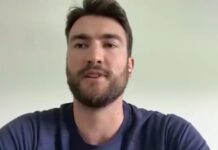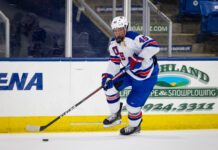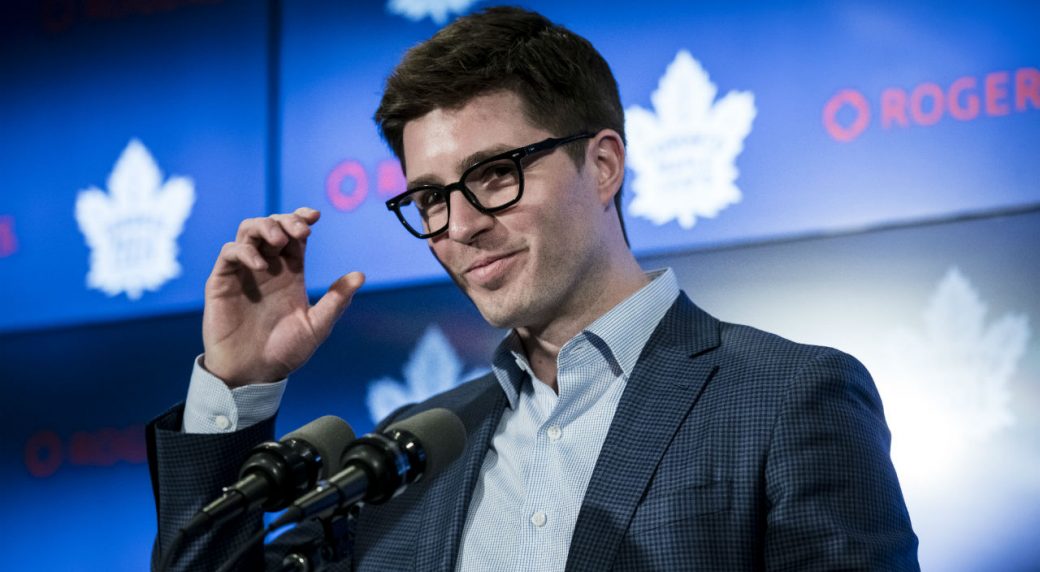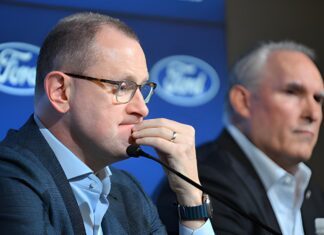Toronto Maple Leafs GM Kyle Dubas joined TSN Overdrive and Tim & Sid on Thursday evening, discussing the acquisition of Jack Campbell and Kyle Clifford, Frederik Andersen’s health, the team’s addition of toughness to the lineup, the cap challenges with players on LTIR at the deadline, and the adversity the team is facing in the standings with under 30 games left in the 2019-20 regular season.
Take us through the timeline — why now, or why last night, did you make a move for a backup goalie?
Dubas: It was moving that way, really, throughout the day yesterday. I would even go back to Tuesday when we traveled to New York. With the trade deadline now on the horizon, I think teams were a little bit more certain about what they were going to do and wanted to do, so we had the opportunity to act and got it done late in the evening last night. These things usually take shape over the whole season and different discussions with different teams about what they are looking to do and the way they may go. We just decided yesterday that we were going to act and we were able to come to meet the price of LA and after going back and forth, get that done after the game.
How much did Hutchinson’s play and the Frederik Andersen’s injury factor into the timeline?
Dubas: Hutch, prior to last night, had won the last number of his starts, but certainly, the Freddy injury, when we have a bonafide number-one goalie, his absence looms large. There are certainly different comparables in different sports, whether it’s a quarterback or your number one pitcher, or whatever that may be with whatever type of team and sport you’re involved with. There is always a level of anxiety that if something happens to him, how are we going to be able to deal with it? Injuries are always a part of it.
I think we, throughout the season — particularly early in the year when Hutch kind of had his struggles and then rebounded really well — it had always been something we were kind of looking into, whether it was going to be depth or somebody who is more of a bonafide NHLer like Jack Campbell. We knew we were going to go down that path. Once Fred’s injury happened, we had everybody calling us that had a goalie available anyway trying to see what we were going to do. We kind of knew what the price points were and the direction we wanted to go.
The part about Campbell that is also attractive is that he is locked up for two more years beyond this, so we will have a set goaltending tandem and be able to roll with it.
Was that a vulture type of thing with teams circling and calling you? How do you kind of decipher that?
Dubas: The key for us is that we didn’t want to do anything panicked. We knew what our prices were, and I think other teams on the other side of it also know that there are other goalies available. Even though Freddy going down on Monday was certainly an incident for conversations to escalate and we were the one with the injury, we were able to hopefully use our knowledge of what other goalies were out there to not have to overpay because of the panic of our goalie being out, and just make a hockey deal.
Dusty Imoo, the former Kings goalie coach, was on Leafs Lunch today. He used the word “gem of a human” when describing Jack Campbell. You have personal experience with Kyle Clifford as well. What can you tell us about these players that we don’t already know beyond the score sheet? What do you expect them to bring to the dressing room?
Dubas: We learned last year bringing Muzzin in the importance of the character of the people we are bringing in and how it helps them adjust. They are coming in mid-season. I don’t think that is ever easy as an athlete, especially coming to a team where we’ve had a lot going on this year. We had a coaching change and various ups and downs. We are bringing guys into a team that has been together now for a while — especially the younger core parts of it, and some of them much longer — and we wanted to make sure that the two we were bringing in fit what we needed in terms of the character of the group and were also going to be high-quality people.
I also had the benefit of knowing both from previous stops in my own career and then having people who have worked with them at different spots was a big help. In terms of what we can expect, they are two of the hardest working players that I have been around in terms of their commitment in practice and to their workouts and preparation and in the gym. On the ice, in practice and in games, they are two very, very competitive people. I think that is something that our whole organization and all of our players will stand to benefit from.
In particular, goaltenders are goaltenders, but Clifford, in the way that he carries himself and operates on the ice and in practice and what his expectations are not only of himself but others, he will be a boost to our leadership group and a big help to us.
You mentioned Frederik Andersen getting hurt on Monday. Is there any update on him?
Dubas: He skated today. I haven’t gotten the full update yet. Sheldon will probably be able to give a further update tomorrow and we’ll find out tomorrow if he can go for the morning skate. With him, we’ve got to continue to take the long-term approach to it and make sure he is 100% right and that he is not rushed back because he is obviously a key, important player for us.
It was great to see him out there today. It is certainly encouraging to see him out on the ice. We will continue to monitor that and handle it carefully as we go through the week, but it was a real positive sign today.
You just mentioned Sheldon Keefe. Is there one thing in particular you’ve seen out of your team that has been different from a positive perspective since he took over?
Dubas: Our ability to move the puck up the ice and our ability to score — we’ve been near the top of the league in scoring — and the way we are getting up the rink, and the way that we have been able to adapt as we’ve gone through and teams have had time to gameplan for us. The teams that we have played again for a second time, how we are adapting and we have been able to continue to grow and improve on the offensive end has been fun.
I know there have been some games — and recency bias would be big here because some of them have been of late — where our goals against have been rather high with egregious mistakes such as last night late in the first period there off the two faceoff plays. But I think we are making strides as we showed on Monday night against Florida. We have a long way to go in every regard, but I am happy with the progress we’ve made.
I asked our guys today to show me where we’ve been in the league since the change and I think we are tied for fifth in points percentage and that is with a bit of a bump in the road before the break and then last night and Monday. We are on the right path. This next stretch and how we come through it is going to be huge in the long run for our program. I think that is why it is more exciting than it is anxious because it is a great opportunity for our guys to grow in a playoff race where every single game is so important, helping their mindset of being ready every single night and being locked in down the stretch.
You mentioned a long way to go as far as defensive play or structure. Do you not find it frustrating that it’s kind of the teachable thing? You can’t teach guys to score goals or put it in the net, but you can tell them where to stand or how to position themselves. The defensive end of it is the more simple thing to teach.
Dubas: I think it is more so just the mindset of the guys at times. On Monday night was the most recent, primary example, where when we are locked in and our mindset is where it needs to be in terms of the defensive side, we get through the second period and they were credited with a shot but it might’ve been on a dump in. We weren’t giving up anything and we were excellent in our defensive play throughout, and then you have moments like last night where you see in six seconds they score twice. One is a faceoff play in the offensive zone and sometimes that’s the way it goes — you hope it doesn’t — but then the next one, we win the draw and they jump through and fly through the ice against us.
Our mindset and our growth and ability to use these experiences to be absolutely locked in every single time… I would agree that yes, on the surface, that should be the easier stuff to nail down and certainly for us to get a good handle on. We’ve shown that ability to. We are still showing signs of some poor play in that as well, but I’ve got a lot of faith in Sheldon and our group that as we continue to roll along here late in the year, we will be more of the team that we were against Florida than we were in those six seconds last night against the Rangers.
You addressed a couple of needs with this trade. What are other moves you are keeping an eye on — is it the blueline, or something else that you are kind of sniffing around on to see if there are potential moves to be made?
Dubas: With Rielly and Ceci out right now, it certainly puts a bit of a spotlight on the blue line. With some of the contractual situations of our blue liners, it is an area we are going to have to continue to look at and address in the long run. We’ve got, obviously, Sandin, and Liljegren has played one game and continues to play well with the Marlies. We’ve got some young guys coming on the blue line and some guys further behind them that we think will play in time. It has been great to see Justin Holl progress throughout the year. In the long run, that will be the area we continue to look at.
We really like our forward group, especially adding a bit of a different element in Clifford to it. With Fred and Campbell and Hutchinson and Kaskisuo, we like our goaltending and our goaltending depth. It really for us puts the spotlight on the injuries and the two defensemen right now. For one, in the short term, seeing what our guys that have been thrust into greater opportunities can do, whether that is Dermott or Sandin or whomever. That is the area in the long run that we will continue to take a look at.
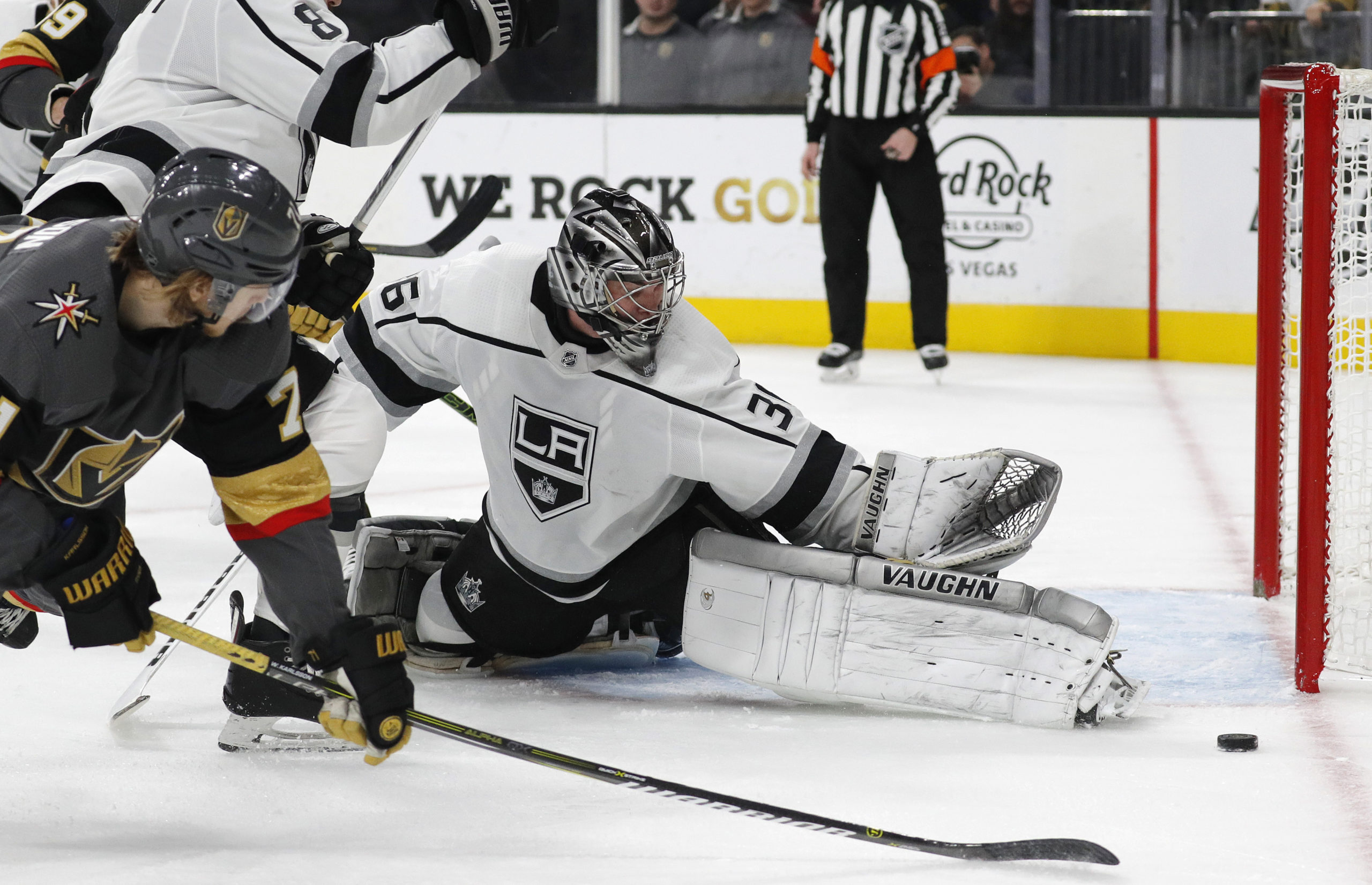
How much do the injuries complicate someone in your position where you could probably use someone on the blue line between now and Feb. 24?
Dubas: I think it complicates things pretty significantly. This is a year where, because of the cap space situation in the league, there are quite a few times in LTI with regards to their salary cap to give themselves space. When you use that, it doesn’t accumulate over the year. If any of the guys that are on LTIR are going to come back during the season, you really don’t have that space to bring other players in between now and the deadline.
You referenced Calgary and I’ve seen the unfortunate news for them. We are the same with Ceci and Rielly, right? You presumably have their space to use but you don’t know whether you can use it because you’re going to need that space to bring them back if and when they’re healthy.
It is going to probably be pretty touch and go, I would project, up until the deadline. Teams are going to try to get reports on their guys and when they may be back if at all before they can determine if they can use that salary cap space.
What does that mean for Morgan Rielly? How much of a fear is it that he may not be able to come back at any point this season?
Dubas: I think that, just because of the timeline, it will be very close. He was injured in Florida on January 12th — off the top of my head — and the injury is a minimum of eight weeks. He doesn’t have the first time that he gets his cast off and they’ll see how the foot is healing. We won’t really know until then whether it is healing on time or whether it’s early or delayed. What it would mean is that he is on injured reserve, but you can presumably use the space, but once you use the space, if you don’t have those dollars available, you couldn’t just fill it with Morgan Rielly when he is healthy. It doesn’t double your cap space. It is binary — you either have it or you don’t.
If we were to get news… There really is not a win in this situation because if Morgan wasn’t going to be back, that is not good for us. If we had his space, we are just going to have to go out and find somebody else, presumably, if we had that. I think there are a lot of teams in this situation because of injuries and their salary cap situation. What that will mean is that they will probably be taking it down to the wire and getting reports on how long a player will be out for before they determine what, if anything, they can bring in at the deadline.
Presumably, you want someone like Morgan Rielly back before the playoffs start anyway, right?
Dubas: Absolutely. He is such a vital player for us and has been for so long, not only on the ice but off. Like I was saying, if we had news that his recovery has slowed down, that wouldn’t be optimal for us, either. Our hope is that at his next checkup, we will get news and we can use him in effect as a trade-deadline acquisition because hopefully, he will be back shortly thereafter. If it is going to be a little bit longer, we will have to further examine all of our options that are available and go from there.
In hindsight, do you wish you had done something like this (acquiring a backup goalie) earlier in the year?
Dubas: I think anytime you can improve the team, you want to do it as soon as you can, going back to the summer or earlier in the season. If you are going to pay out assets, I think you’d rather be able to utilize the players that you have coming back for a greater portion of your schedule. In Campbell’s case, he is not a rental. He has this year on his contract and two more years after that, so that is a little bit different. In the case of Clifford — sure. He is a UFA at the end of the year, so we will see where that whole thing goes as he gets settled in here. The longer you can have the players, it is logical to say that if we could do these types of things earlier, we would like to. It is, unfortunately, the way that the season and the deadline goes. It usually doesn’t start to shake loose until now or later.
If Frederik Andersen doesn’t get hurt this week, would you say this probably happens?
Dubas: I would say so, yes. It would’ve continued to go that way, is the way I’d have viewed it. With the way the conversation was going with LA, once he did get hurt, it certainly creates that anxiety, when you are relying on one player and that player gets injured. There are teams in hockey that have shifted more toward the tandem style. We are fortunate that we have Fred, who is a bonafide number-one goalie, but you always have that in the back of your mind: What if he gets hurt? What are we going to do?
Throughout the year, Michael had a difficult start to the year and then he really rebounded well. It was always something in the back of our mind that if there were someone like a Campbell or someone more depth-related… We kind of explored everything. We were moving towards something probably happening before the deadline.
Are you comfortable with Jack Campbell playing a chunk of games here if you need him to?
Dubas: I think he has shown the capability over the last few seasons — notably last season, and as the season has rolled along this year — that he can shoulder a good portion of the games. For us, it will give us great confidence to roll him out as often as needed here in the short term. In the long run, we’ll be able to spell Fred more and have the two of them work in tandem and challenge one another in that way and work together. If in the short term we need him to roll with it, we are confident, especially after the initial settling in period. As he gets used to the way that we play in front of him and the systems and how they may be different in terms of his reads of plays and saves he has to make here vs. LA, as he settles in, I think it will be a good fit.
The exciting part for us with him is that he is locked in for term, so it is not one of those things where there is going to be consternation where it is going to be a lingering question as we move ahead. We know he is going to be there and we know Fred is here as well. We will hopefully continue to roll along with the two of them.
Does the addition of the sandpaper and grit part of what Kyle Clifford brings something you felt you needed to add? It’s something your fans have been saying you guys need in that category.
Dubas: Sure. I know it is something that there has been a lot of anxiety over. I think one of the misconceptions is that we have actively not had players who have those elements on the team. The way that we have viewed it is that we don’t want to sacrifice talent and we don’t want to sacrifice our ability to play and hide someone who plays very minimally throughout the game. We wanted to make sure we found the right player who can fit our system and the way we wanted to play.
The issue with that is that those players now don’t come in real surplus. They are hard to track down and find. That is why when you hear some of them are available and you hear some of the prices thrown around, it is because they are so scarce. Even going back to the junior ranks and the draft, I think some players can develop those elements of toughness and physicality, but there isn’t a whole lot of players like that coming up, really.
When we had the chance to add Kyle to this discussion, we felt it was a good fit. It was something we needed in terms of how competitive he is and his experience in the playoffs with the two Stanley Cups in Los Angeles. Also, there is the fact that we feel comfortable we can put him out there and he can go up and down the lineup as needed and is just going to do his job. If there are things that happen on the ice, he has the experience of how to deal with them and how to help our guys.
It is not about fighting or anything like that. It is just about his presence and his work ethic on and off the ice that we think will be a good fit. We can start to address something that I would agree on is something we have lacked and has been exposed at times. I know we have the reputation that we don’t really want that, but we do so long as the player can go out and play. I know those players aren’t overly available. When we had the chance here today, we tried to strike. We are excited to see them both tomorrow.
The panic in the market over the fact that the team is one point out of the playoffs right now — how do you absorb that?
Dubas: I understand why everyone gets… Especially in the last month when we had the stretch right before the break where we played really, really well coming out of the game against the Islanders in January and then the two weeks before the break where we had five of six at home and we didn’t play to our expectation or the way that we can. That sent us into the break on a really bad note. We woke up out of the break and we were four points out of the playoffs. It sent a clear message to our players that the time is now. We have more to give and we have to give more.
We came out of the break and through two periods against Florida after the games on the road in Nashville and Dallas… The game against Ottawa was a grind, they played very well against us, and we were able to find a way to win. You can get so caught up in what has just happened and lose sight of the long game.
Since Sheldon has been in, we are tied for fifth in the league in points percentage and I still think we have more to give beyond that. If we can just continue to keep our heads level and go through this test that we have put ourselves into, I think it is going to be a great thing in the long run for our players.
I talked earlier about the Raptors, who have won 12 in a row, and they can play any way you want. They can get up and protect the lead. They can be down by nearly 40 points and come back and win. They’ve got a real competitiveness and spirit to them, but they also have the scars from four-five-six years ago that made them into what they are today. It doesn’t just happen overnight. It is years in the making, usually. We’ve already been through a few of those years and have some of those scars, but how we go through this, I think, will really benefit our whole program in the long run. It is just being able to keep marching on as the public, and even some people internally, perhaps, get a little bit frantic about where we are at.
We just need to keep doing what we have been doing in the last number of months here and start to eliminate some of the poor performances and some of the poor moments from our game and start to really grow. When we do that and continue to go through these types of experiences, we are really going to see some growth from our group and our program and start to go to the heights we are capable of.




